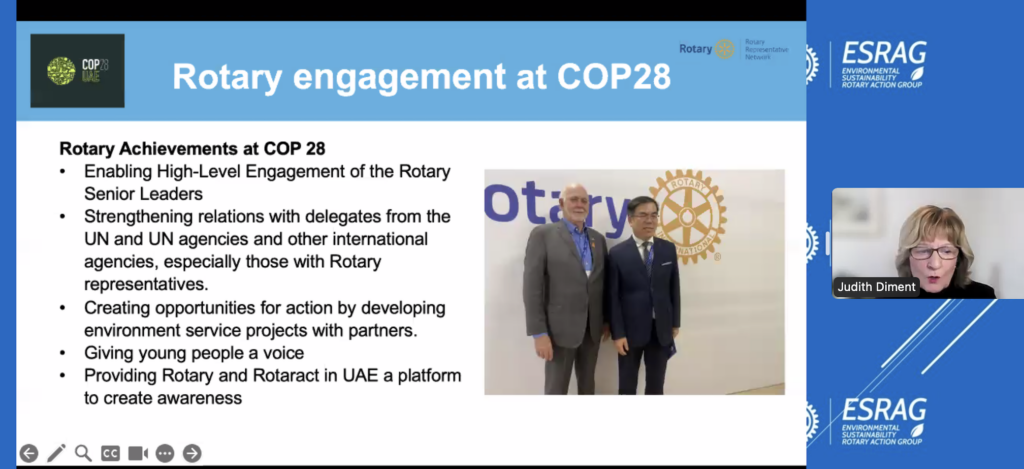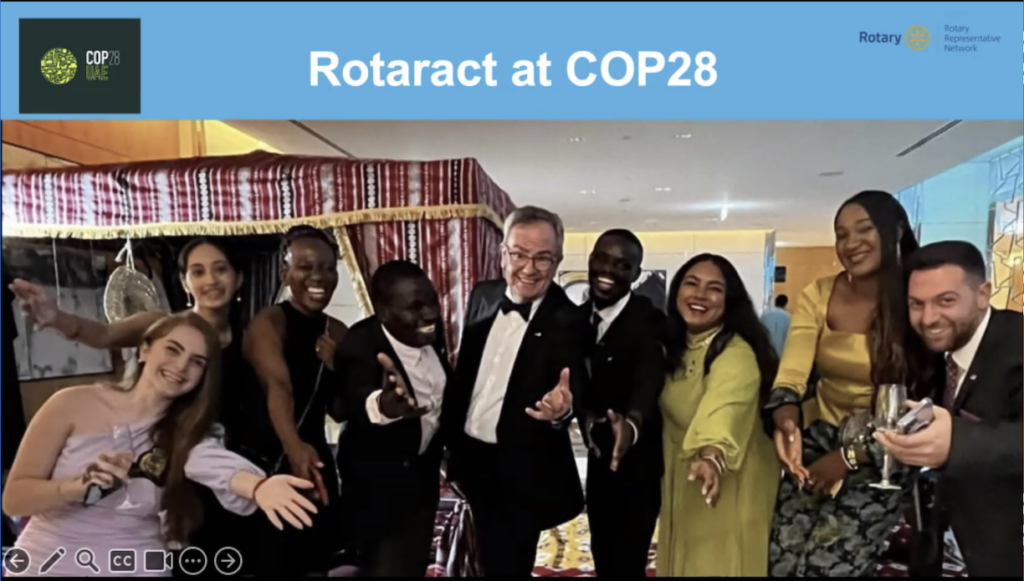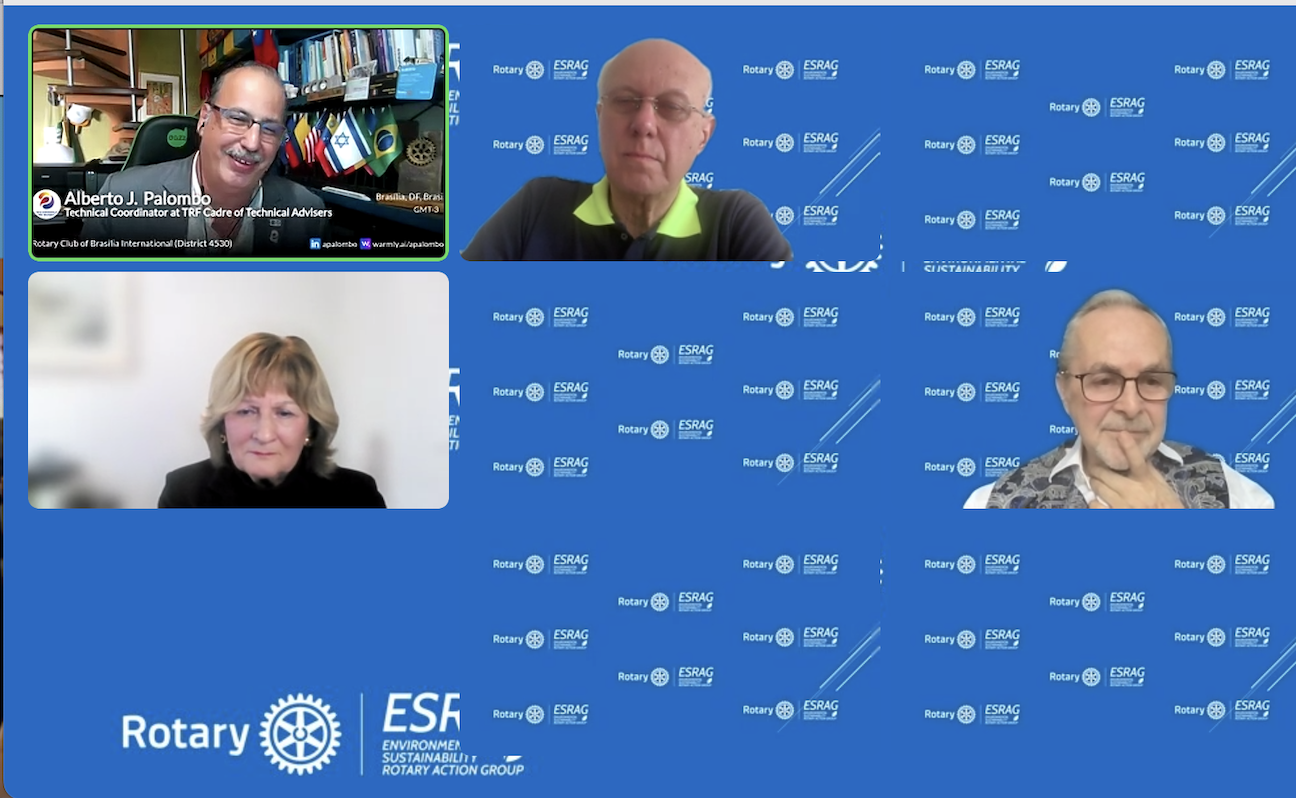by Ariel Miller, ESRAG Newsletter Editor
People from 62 nations registered for ESRAG’s Feb. 7 webinar with Judith Diment of Great Britain and Rotary International President Nominee Mário César Martins de Camargo of Brazil, eager to hear about the results of Rotary’s participation in COP 28, the 2023 UN Climate Conference.
In dialogue with ESRAG Chair Yasar Atacik and several of the Rotaractors chosen to represent RI at COP 28, these two top leaders gave a dynamic, practical, and candid read-out. It concluded with a compelling call to action from RIPN Mario, who has advocated for years to expand Rotary’s environmental action. He urged us to lobby for Rotary’s continued participation in COP, because the time and financial commitment Rotary made to COP 28 is far from assured going forward.
You can watch the webinar on ESRAG’s website, by scrolling half way down the Climate theme page.
As Dean of Rotary’s Representative Network, Diment leads the global team of Rotary ambassadors to UN agencies and the Commonwealth. This is the third time she has chaired Rotary’s official COP delegation, but COP 28 was the first attended by all three of Rotary’s top leaders: RI President Gordon McInally, Foundation Chair Barry Rassin, and General Secretary John Hewko. It was also the first time Rotary reserved pavilions in both the Green (public) and Blue (policymakers) Zones, enabling RI to greatly expand networking.
Mounting these pavilions was expensive, requiring sponsorships from many donors, but Rotary’s enhanced visibility and engagement catalyzed new or expanded partnerships. The event proved revelatory for Rotary leaders who met an array of other Rotarians attending on behalf of NGOs, government, or the private sector. The Rotary talks, conversations and social events in the pavilions created opportunities to forge friendships and connections that will facilitate collaboration with partners like the World Health Organization.

Rotary accomplishments at COP 28.
Diment cited several outcomes that will expand Rotary’s humanitarian impact, including stronger relationships with UN agencies worldwide, the massive sum raised at COP for global health initiatives including polio eradication, and the signing of MOUs for Rotary to participate in the Global River City Alliances for the Ganges and Mississippi watersheds. Rotary’s environmental experts – including the Rotaractors – partnered with experts from the UN and other sectors to present 30 programs on the importance of climate action to all the other UN Sustainable Development Goals. “We had over 100 world-class speakers,” Diment said.
RI’s President-Nominee Mário César highlighted how crucial it is the world, for Brazil, and for Rotary to accelerate climate action. He reminded us how Rotary abandoned the Preserve Planet Earth campaign of the 1990-91 RI President, Brazilian Paolo Costa, and noted his own longstanding advocacy for environmental action.
Despite Rotary leaders’ decision to adopt the environment as a Rotary Area of Focus in 2020, many factors are slowing us down. “I’m fighting against this laid-back attitude – ‘oh, we’re working on polio, so we can’t do anything else.'” RIPN Mario said. “We’re squandering resources. We have a lot of manpower and womanpower! Polio is almost done: we need to consider other issues of concern to humankind.”
But, he added, we shouldn’t try to do it alone. To show why, he cited Rotary’s experience with polio. Every dollar Rotarians donated for polio eradication leveraged far more – a total of $18 billion – from other donors. Without this outside support “we wouldn’t have been on the cusp of eradicating polio,” he pointed out. “We are good at raising money but we are much better in advocacy.”
“Partnerships are one of my three priorities for membership,” he added. “I’m tired of preaching to the choir! We have to preach beyond Rotary, because that’s where future Rotarians and future contributors are.” His emphasis on collaboration reinforced Judith Diment’s report on the synergy and leverage generated by Rotarians’ networking and negotiations at COP.
But ESRAG members also need to advocate within Rotary, RIPN Mario urged us. “Initial reaction to participation in the next COP is not positive: we have to lobby. Talk to your District Governor, talk to your RI Director. They are the people who vote.” He recommends that Judith Diment and fellow ESRAG members report on COP 28 to the environmental committees of both RI and The Rotary Foundation in support of participating in upcoming climate conferences.
COP 30 will be held in Brazil during Mário César’s year as RI President. “Not attending COP 30 would send the wrong message to Rotarians in South America,” he warned us.
At the end of the discussion, Judith Diment emphasized again that climate change cuts across every Rotary Area of Focus.
Mário César closed with another call to action: advocacy to our fellow Rotarians. He had alluded to the challenge in his own country: as the heart of the Amazon, Brazil is center stage for world environmental concerns, “but not many Rotarians are engaged,” he said. (A notable exception is Alberto Palombo, Chair of ESRAG Brazil Chapter, who was a deliciously vibrant participant in the webinar).

Rotaractors with RI President Gordon McInally at the gala hosted by RI at COP 28.
“Trickling down to local clubs is our biggest challenge, on every policy decision made by the board. From 19 people to 1.4 million Rotarians, we need to communicate directly and be honest,” said RIPN Mário. The message “may stop at several floors. It’s a tough challenge, not only exclusive to environmental communication. It applies to everything we do.”
And this is where ESRAG’s growing capacity will prove its value, because we’ve got cheerful, successful Rotary environmentalists on every one of those floors, from the Rotary Foundation Trustees to Interact Clubs in rural schools.
The March newsletter is packed with great examples: a district governor reports how her district achieved Net Zero, a Rotaractor explains how he launched a nonprofit with fellow students and has already raised a huge amount of money in cash and donations to put solar panels on homes for low-income people.
ESRAG members’ environmental successes are starting to be showcased in Rotary periodicals all over the world. We’re proving Rotary’s power to improve environmental conditions, on every continent where people live, strive, worry, and hope. Let’s build on that momentum!
